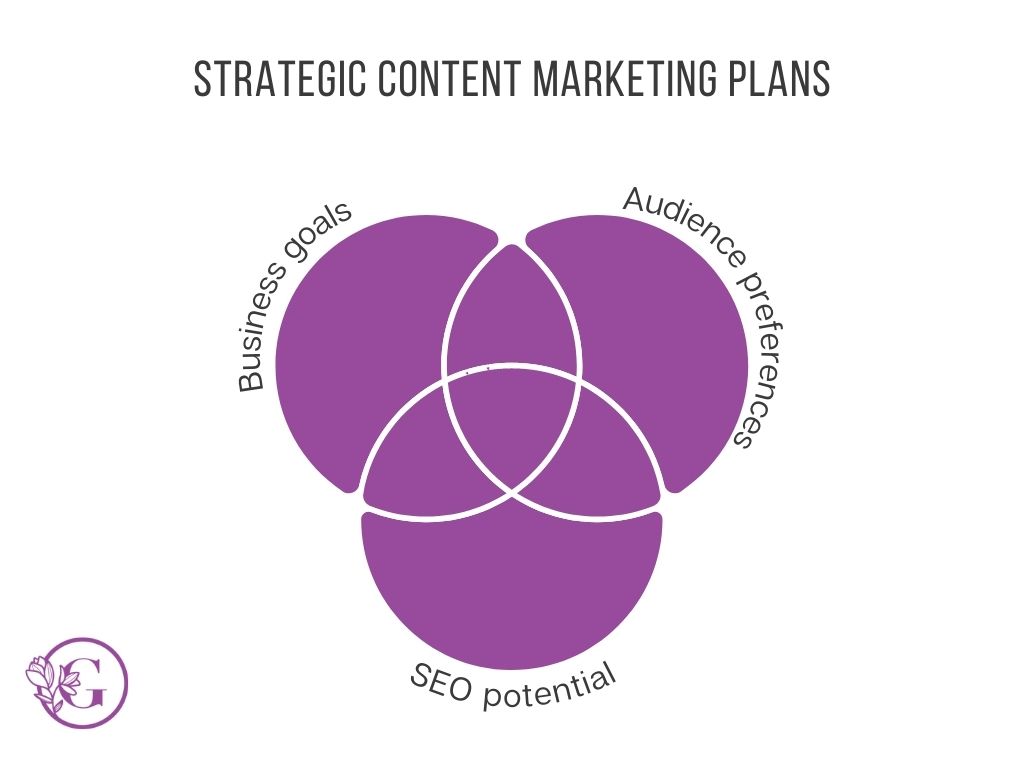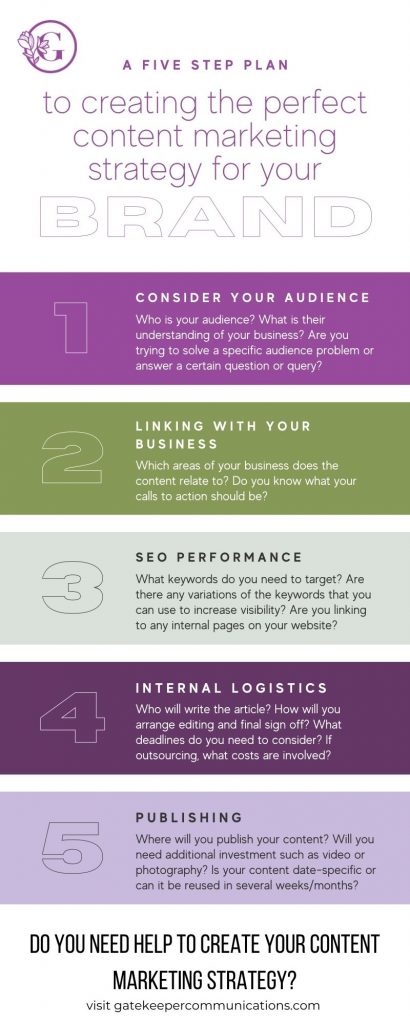We regularly have a discussion with clients about the importance of creating a strategic content marketing plan. This is where you combine all facets of your business to ensure that any content focuses on your business strengths and high-profit products or services. It’s a way of ensuring that your content is relevant, focused, and effectively converts your audience into paying customers.
It may seem like an obvious approach to content marketing, but small businesses often neglect their content plans because they do not have the time or resources in-house to keep them updated.
As experts in strategic content marketing, we take the time to work with our clients to help them understand how they can make the most of their content. First, we get to know your business goals and understand which areas of your business are your primary revenue drivers. From here, we can create a comprehensive content plan that allows you to highlight your business strengths quickly and easily.
But how do you know whether you are making the best use of your content?
What tools do you have in place that will determine the success and impact of your content?
In our handy guide, we look at how you can make the most of your strategic content marketing plans and share some of our top tips for success.
What is strategic content?
Put simply, strategic content is content that you are actively using to grow your business successfully.
It’s a way of planning what you should be writing about and how you should be using that content.
Your content marketing plan should comprise a variety of ways that you are using your content to share information with your audiences. It may include publishing articles or blogs on your website. It could be about what you post on social media. Content marketing includes the content that you contribute towards external press through a targeted PR campaign. It can even be through your use of email sign-offs or within your internal communications.
If you want to be strategic in your approach to content marketing, you need to think carefully and logically.
Taking steps to prepare a comprehensive content marketing strategy can be a useful way to ensure that you are getting the most value for money out of your content.
As you delve into a content strategy, you may ask yourself the following questions.
- What do you plan to write about?
- Why do you want to write about it?
- Who are you writing it for, and what is their level of knowledge/understanding of you and your business?
- Who will write it, and are there any relevant deadlines?
- How will the individual piece of content meet your business goals?
- How will the individual piece of content meet your audience’s needs
- What keywords will you need to include to ensure it is suitable for SEO?
- How will you actively use your content
- Where will it be published?
- What internal or external pages will it link to?
- Will you share it on social media?
- Have you considered linking to your published content in your email signatures?
- Will it be shared internally?
What is more important in a content strategy – business goals or audience preferences?
The ideal content strategy will form a seamless bridge between your business goals and revenue drivers and your audience preferences.
When managed correctly, your content should highlight your strengths and focus on the areas of your business that have the highest profit margins. After all, you want your content to generate a positive return on your investment.
But your content strategy should also focus carefully on your audience’s needs. For example, you could have an exceptionally well-written piece of content published on your site. Still, if it’s not relevant to a concern or query that your customer may have, then it may struggle to generate any traction.
Added to the complexity is the growing importance of content strategies for SEO purposes. Often, firms add new content to their websites to attract new traffic from search engines. Suppose you can identify any potential keywords (or variations) that could drive significant traffic to your website. In that case, you should consider how to weave this into your wider content marketing plans.

There is no right or wrong answer to decide which to prioritise.
After all, each business is different.
Some businesses may be better suited to focusing on their business strengths, products, or services. Others may be more customer-focused. In which case, your content marketing plans could be better suited to focusing on what your customers are commonly asking you or are searching for.
If you would like some advice on making the most of your content marketing strategy, please get in touch.
What should be included within a strategic content marketing plan?
Writing a strategic content plan needn’t be overwhelming. Instead, it may help you break it down into a logical step-by-step process.
At Gatekeeper Communications, we work with small and medium-sized businesses throughout Suffolk to help them develop and implement a content marketing strategy. But if you are unsure if outsourcing is the right step, here are some pointers to help you get started.
We recommend breaking your content strategy down into five distinct areas:
- Audience
- Business priorities
- SEO input
- Internal logistics
- Publishing channels
By considering each element individually, you can see an effective strategy begin to emerge.
Your content plan doesn’t need to be complex – even just writing the answers to each question in bullet point form can be enough for you to see how you can think carefully about your content. In addition, it can be a useful tool to help you visibly see how multiple pieces of content can combine to work effectively with your wider business goals.

Is it the right time to outsource your content marketing needs?
Outsourcing can be a cost-effective way of managing your content marketing. Not only can you focus on your day job, but you may find that working with a content marketing expert provides you with new ideas and perspectives.
We often hear from clients that they welcome our input because we can think independently. As we are ‘outsiders,’ we can spot and suggest content ideas that you may not have thought were interesting.
We hope that this guide gives you some helpful pointers for making the most of your content marketing strategy. But if you need some additional help to create a comprehensive plan or even bring your existing plan to life by writing your content and keeping you on track, please get in touch.
We work with businesses across various sectors, from used cars to IT, from luxury goods to recruitment. And with our know-how and flexible writing style, we can ensure that you get a great return on your investment.
To find out more about our content marketing services, please get in touch.

